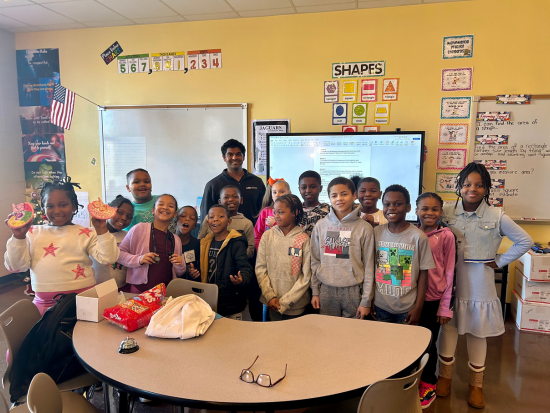 The Department of Neurosurgery at the University of Alabama at Birmingham is bringing its expertise to local elementary schools to spark interest in STEM fields—science, technology, engineering and mathematics..
The Department of Neurosurgery at the University of Alabama at Birmingham is bringing its expertise to local elementary schools to spark interest in STEM fields—science, technology, engineering and mathematics..
“We’re joining the effort to help fill the health care workforce pipeline with better prepared, highly engaged students who are interested in a career in one of the STEM fields,” said James Markert, M.D., MPH, chair of Neurosurgery in the Marnix E. Heersink School of Medicine. “That’s why we launched a STEM-in-schools volunteer initiative within the department.”.
The initiative, part of a collaboration with Neurocamp—a national mission:brain Foundation project—aims to connect young learners with healthcare and medical career pathways. Volunteers visit schools to introduce neuroscience concepts and foster excitement for STEM disciplines.
Recently, Rishi Devulapalli, a student at the Heersink School of Medicine and co-president of UAB’s mission:brain chapter, visited Oxmoor Valley Elementary School for its annual STEAM Day. Devulapalli’s interactive presentation for third graders explored the fundamentals of neuroscience, fun facts about the brain, and career opportunities in science.
“What a great experience,” said Devulapalli. “The students were surprised at how fun the brain could be! There were definitely some future doctors and scientists in the room.” Drawing of the brain done by a student
Drawing of the brain done by a student
STEM education integrates science, technology, engineering and mathematics into a cohesive system that encourages students to develop sustainable and innovative solutions to real-world challenges. The approach emphasizes critical thinking, problem-solving and collaboration.
Science fosters research and critical thinking skills, providing students with a deeper understanding of the world. Technology prepares learners to thrive in a fast-evolving, high-tech environment. Engineering sharpens problem-solving abilities and enables students to apply their knowledge to various projects. Mathematics teaches students to analyze information and eliminate errors when making decisions and designing solutions.
Connecting in the classroom
Outside of the most recent visit, the Neurocamp team, which is made up of medical students and UAB Department of Neurosurgery staff and faculty, also met with a seventh-grade science teacher at Booker T. Washington K-8 School and developed a neuroscience curriculum. As part of the curriculum, the volunteer team now goes to this school once a month to teach a different neuroscience topic. These sessions include interactive games and hands-on learning activities designed to help students retain knowledge. At the end of the year, students will present their projects at a celebratory event for their families and peers.
These monthly sessions are designed to be interactive with fun games to provide a hands-on experience with the knowledge and ultimately allow the students to showcase everything they’ve learned through a collaborative group project.
Currently, members of the Neurocamp team include Devulapalli, along with Department of Neurosurgery Clinical Research Administrator II Brandy Nix, MBA, MA, Division of Pediatric Neurosurgery Clinical Research Coordinator II Tori Holland, and medical students Emma Mason and Abdul Kaimari.
“This initiative means a lot to me,” said Devulapalli. “I would not be where I am without all the mentors in my life, so to give back to the community and work to inspire and guide these children is an incredible honor.”
Devulapalli highlighted how volunteers simplify complex neuroscience topics to make them engaging and accessible for young students. “I had the kids think about their parietal lobe while navigating the room with their eyes closed, balance on one foot to focus on their cerebellum, and associate their favorite songs with their temporal lobe,” he explained. “One student told me they didn’t know science could be this fun, and that made my day.”
A collaborative effort
While this initiative originated in the Department of Neurosurgery, Devulapalli has recruited volunteers outside of neurosurgery by contacting UAB’s undergraduate advisors and UAB graduate and medical school groups.
While this initiative originated in the Department of Neurosurgery, Devulapalli has recruited volunteers outside of neurosurgery by contacting UAB’s undergraduate advisors and UAB graduate and medical school groups.
“It’s amazing to see the wide array of volunteers we get from different schools and levels of training,” said Devulapalli. “Not only are we working to inspire the kids, but we’re also fostering peer mentorship within our volunteers as we work together on this shared task.”
Through efforts like this, UAB Neurosurgery hopes to inspire the next generation of leaders in science and medicine.